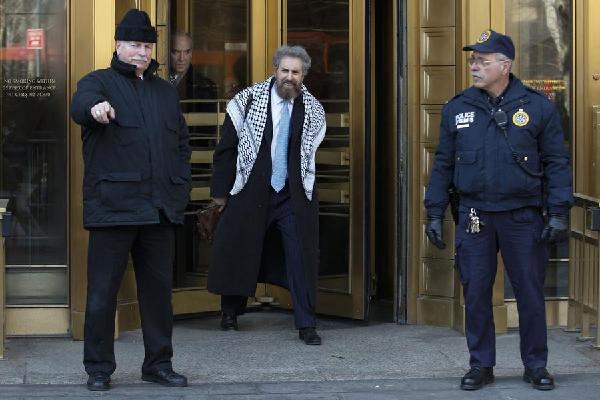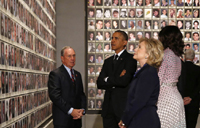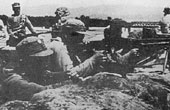Bin Laden's son-in-law gets life in US prison
(Agencies) Updated: 2014-09-24 14:18
 |
| Stanley Cohen (C), defense lawyer for Osama Bin Laden's son-in-law Sulaiman Abu Ghaith, exits Manhattan Federal Court in New York, March 26, 2014, following a three-week trial that offered an unusually intimate portrait of al Qaeda's former leader in the days after the September 11, 2001 attacks. [Photo/Agencies] |
NEW YORK - Defiant to the end, Osama bin Laden's son-in-law was sentenced Tuesday to life in prison for acting as the voice of al-Qaida after the Sept. 11 terror attacks, telling a judge that there would be a price to pay for trying to "bury me alive."
Sulaiman Abu Ghaith, the highest-ranking al-Qaida figure to face trial on US soil since the attacks, quoted from the Quran, praised Allah and suggested his case would prompt a backlash in the Muslim world.
 |
| Obama at 9/11 museum: Terrorism can't break us |
US District Judge Lewis A. Kaplan, told Abu Ghaith his defiance was further proof he deserved life behind bars.
"You haven't evidenced any doubt about the justification for what was done, and as recently as 15 minutes ago, you continue to threaten," the judge said. "You, sir, in my assessment, are committed to doing everything you can to assist in carrying out al-Qaida's agenda of killing Americans, guilty or innocent, combatant or noncombatant, adult or babies, without regard to the carnage that's caused."
Kaplan pointed to what he called "revealing" video, used as evidence at Abu Ghaith's trial, showing the defendant at Osama bin Laden's side as bin Laden bragged that he had predicted that the attack on the World Trade Center would cause the twin towers to collapse.
"Bin Laden laughed as he explained that," the judge said. "Others in the room did. You, at bin Laden's right hand, evidenced in your facial expressions amusement. ... It was funny. It was a success, the massacre.''
The defendant showed no emotion as he heard the sentence. Afterward, he smiled and shook hands with his attorneys before being led out of the courtroom.
Abu Ghaith, 48, was convicted in March on conspiracy charges that he answered Osama bin Laden's request in the hours after the 2001 attacks to speak on the widely circulated videos used to recruit new followers willing to go on suicide missions like the 19 who hijacked four commercial jets on Sept. 11.
The jury heard audio from October 2001 of the defendant warning, "The storm of airplanes will not stop" evidence that the government alleged showed the defendant knew in advance about the failed shoe-bomb airline attack by Richard Reid in December 2001.
Abu Ghaith took the witness stand in his own defense, calmly denying he was an al-Qaida recruiter and claiming his role was a religious one aimed at encouraging all Muslims to rise up against their oppressors. He insisted he agreed to meet with bin Laden in a cave on the night of Sept. 11, 2001, out of respect for bin Laden's standing as a sheik.
"I didn't go to meet with him to bless if he had killed hundreds of Americans or not. I went to meet with him to know what he wanted," Abu Ghaith said.
In asking for leniency on Tuesday, defense attorney Stanley Cohen argued that, though Abu Ghaith engaged in fiery rhetoric, there was no evidence that his client directly participated in any terror plots. He described Abu Ghaith as someone who found himself "caught in the crossroads of history."
Prosecutor John P. Cronan, in arguing for a life term, said Abu Ghaith was more valuable to al-Qaida than a suicide bomber because of his willingness to use religion to attract more recruits for the "murderous mission" led by bin Laden.
"He did not just find himself in a bad situation he couldn't get out of," Cronan said. "He was all in. At no point did Sulaiman Abu Ghaith back away from that commitment."










